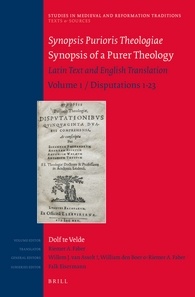The Extent of Inerrancy


I’m working on my review of Synopsis Purioris Theologiae, also known as the Leiden Synopsis. This is an important piece of our Reformed theological heritage. It was first published in 1625 and served as a reliable theological handbook for many years. It’s only just appeared in English translation. My review is being submitted to The Confessional Presbyterian, by the way. Let me just share a brief excerpt from my review:
The Leiden Synopsis is surprisingly relevant on some important theological issues facing the Church today. For example, the doctrine of biblical inerrancy continues to be debated, with some claiming that it is a modern invention, perhaps dating back to the nineteenth century at the earliest. However, in disputation 2, we find Walaeus writing, “It is made clear to us that the authority of Holy Scripture is much greater than that of the Church by the fact that the Church is capable of erring while Scripture cannot” (71). Sometimes it is claimed that biblical inspiration or inerrancy only extends to doctrines. In other words, the core teachings of Scripture are inspired and even inerrant, but this does not apply to peripheral matters. This notion existed in the days of the Leiden Synopsis already and Walaeus had a ready answer in thesis 28:
And here one ought not to pay heed to Socinus and several other Christians who grant that Holy Scripture is divinely-originated in issues of special importance, but that its authors in situations and circumstances of lesser importance were abandoned by the Holy Spirit and could have erred. Because this opinion paves the way for contempt, and expressly contradicts Scripture which testifies that “everything that was written was written for our instruction (Romans 15:4), and “all Scripture is God-breathed” (2 Timothy 3:16). Likewise, “no Scripture is of one’s own interpretation” (2 Peter 1:20); indeed, “not even one iota will disappear from the Law” (Matthew 5:18). “And it is not permitted for any man to add or to remove from it” (Deuteronomy 4[:2], Revelation 22[:18-19].” (69)
In a footnote, the editors point out that besides Faustus Socinus, Walaeus noted elsewhere that Erasmus displayed “the same pernicious view.”
So am I going to recommend the Leiden Synopsis? Absolutely! More information about the book can be found here.


